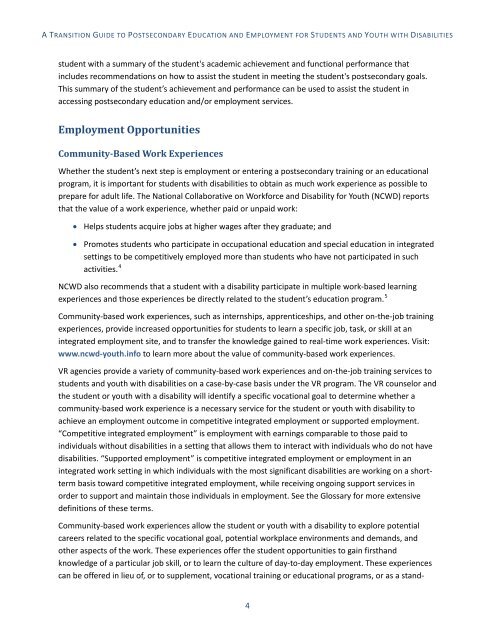TRANSITION GUIDE
2j9tM4H
2j9tM4H
Create successful ePaper yourself
Turn your PDF publications into a flip-book with our unique Google optimized e-Paper software.
A <strong>TRANSITION</strong> <strong>GUIDE</strong> TO POSTSECONDARY EDUCATION AND EMPLOYMENT FOR STUDENTS AND YOUTH WITH DISABILITIES<br />
student with a summary of the student's academic achievement and functional performance that<br />
includes recommendations on how to assist the student in meeting the student's postsecondary goals.<br />
This summary of the student’s achievement and performance can be used to assist the student in<br />
accessing postsecondary education and/or employment services.<br />
Employment Opportunities<br />
Community-Based Work Experiences<br />
Whether the student’s next step is employment or entering a postsecondary training or an educational<br />
program, it is important for students with disabilities to obtain as much work experience as possible to<br />
prepare for adult life. The National Collaborative on Workforce and Disability for Youth (NCWD) reports<br />
that the value of a work experience, whether paid or unpaid work:<br />
• Helps students acquire jobs at higher wages after they graduate; and<br />
• Promotes students who participate in occupational education and special education in integrated<br />
settings to be competitively employed more than students who have not participated in such<br />
activities. 4<br />
NCWD also recommends that a student with a disability participate in multiple work-based learning<br />
experiences and those experiences be directly related to the student’s education program. 5<br />
Community-based work experiences, such as internships, apprenticeships, and other on-the-job training<br />
experiences, provide increased opportunities for students to learn a specific job, task, or skill at an<br />
integrated employment site, and to transfer the knowledge gained to real-time work experiences. Visit:<br />
www.ncwd-youth.info to learn more about the value of community-based work experiences.<br />
VR agencies provide a variety of community-based work experiences and on-the-job training services to<br />
students and youth with disabilities on a case-by-case basis under the VR program. The VR counselor and<br />
the student or youth with a disability will identify a specific vocational goal to determine whether a<br />
community-based work experience is a necessary service for the student or youth with disability to<br />
achieve an employment outcome in competitive integrated employment or supported employment.<br />
“Competitive integrated employment” is employment with earnings comparable to those paid to<br />
individuals without disabilities in a setting that allows them to interact with individuals who do not have<br />
disabilities. “Supported employment” is competitive integrated employment or employment in an<br />
integrated work setting in which individuals with the most significant disabilities are working on a shortterm<br />
basis toward competitive integrated employment, while receiving ongoing support services in<br />
order to support and maintain those individuals in employment. See the Glossary for more extensive<br />
definitions of these terms.<br />
Community-based work experiences allow the student or youth with a disability to explore potential<br />
careers related to the specific vocational goal, potential workplace environments and demands, and<br />
other aspects of the work. These experiences offer the student opportunities to gain firsthand<br />
knowledge of a particular job skill, or to learn the culture of day-to-day employment. These experiences<br />
can be offered in lieu of, or to supplement, vocational training or educational programs, or as a stand-<br />
4


